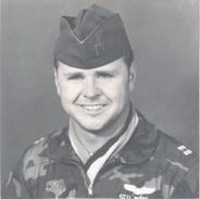Hall of Fame
Mosbey, Colonel James S.

Colonel James Stewart (Stu) Mosbeywas born in 1942, in Owensboro, Kentucky. He moved with his family to Athens, Georgia in 1956 where he graduated from Athens High School in 1960 and the University of Georgia in 1964. He was awarded his private pilot’s license in 1964 and in 1965, he began pilot training with the Class 66-E at Laredo Air Force Base, Texas. Mosbey graduated pilot training with honors in 1966 and began training in the F-4 Phantom, eventually flying every model of the Phantom (Air Force, Navy, Marines, and German) manufactured in the United States. In 1969, he began what was the first of three combat tours in Southeast Asia. Mosbey flew 375 combat missions, with over 250 in the extremely hazardous Fast Fac role. In 1976, he was selected for the United States Air Force/United States Marine Corps fighter pilot exchange program. As operations officer for the VMFA-314, he led the Marines to their first ever participation in the world’s largest tactical training exercise, “Red Flag.” Mosbey completed aircraft carrier landing qualification and was later awarded the Honorary Marine Pilot Wings for his contributions to Marine Corps Readiness. In 1982, Mosbey took command of the 6200th Tactical Fighter Training Squadron leading the largest multi-service, multi-national serial combat training exercises in the Pacific Theater. Upon promotion to Colonel, Mosbey was assigned as the Chief of Standardization and Evaluation at Ninth Air Force, where during this assignment, he spearheaded the effort to reinstate the A-2 leather flight jacket as standard issue to Air Force flyers. This jacket had been standard issue to combat crews from 1938 until being discontinued after WWII. Due to Colonel Mosbey’s efforts, the leather jacket is now standard issue for all mission-ready crews. In 1988, Colonel Mosbey was assigned to Moody Air Force Base, Georgia, where he became Commander, 347th Operations Group. During the Persian Gulf War, the Moody-based 69th Fighter Squadron flew 1,500 combat sorties without loss or damage, earning Colonel Mosbey accolades from his commander and his troops. He has continued his flying career after his retirement, providing pilot services for the University of Georgia, and providing basic tactical aviation instruction to the Air Force, Navy and Marine student aviators at the Naval Air Station Pensacola, Florida. Colonel Mosbey has over 10,000 hours of flight time, with more than 7,000 of those hours being in tactical aviation. His combat decorations include three Distinguished Flying Crosses and thirty-three Air Medals.
In recognition of his distinguished contributions to the field of aviation, Col. James S. Mosbey (ret.) was enshrined into the Georgia Aviation Hall of Fame on April 24, 2010.
